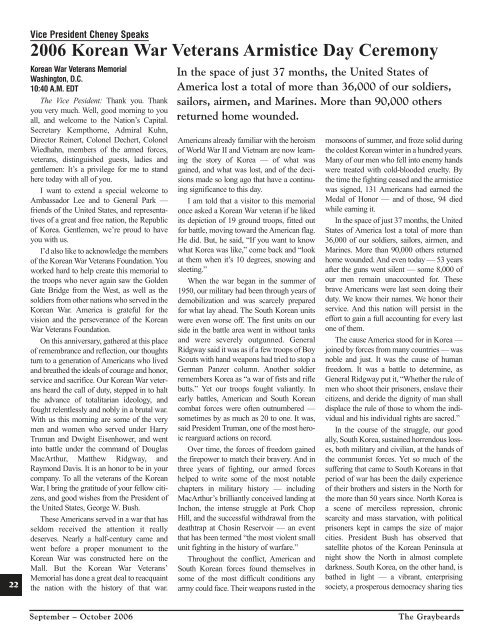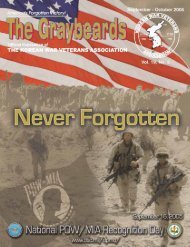The Graybeards - KWVA - Korean War Veterans Association
The Graybeards - KWVA - Korean War Veterans Association
The Graybeards - KWVA - Korean War Veterans Association
Create successful ePaper yourself
Turn your PDF publications into a flip-book with our unique Google optimized e-Paper software.
22<br />
Vice President Cheney Speaks<br />
2006 <strong>Korean</strong> <strong>War</strong> <strong>Veterans</strong> Armistice Day Ceremony<br />
<strong>Korean</strong> <strong>War</strong> <strong>Veterans</strong> Memorial<br />
Washington, D.C.<br />
10:40 A.M. EDT<br />
<strong>The</strong> Vice Pesident: Thank you. Thank<br />
you very much. Well, good morning to you<br />
all, and welcome to the Nation’s Capital.<br />
Secretary Kempthorne, Admiral Kuhn,<br />
Director Reinert, Colonel Dechert, Colonel<br />
Wiedhahn, members of the armed forces,<br />
veterans, distinguished guests, ladies and<br />
gentlemen: It’s a privilege for me to stand<br />
here today with all of you.<br />
I want to extend a special welcome to<br />
Ambassador Lee and to General Park —<br />
friends of the United States, and representatives<br />
of a great and free nation, the Republic<br />
of Korea. Gentlemen, we’re proud to have<br />
you with us.<br />
I’d also like to acknowledge the members<br />
of the <strong>Korean</strong> <strong>War</strong> <strong>Veterans</strong> Foundation. You<br />
worked hard to help create this memorial to<br />
the troops who never again saw the Golden<br />
Gate Bridge from the West, as well as the<br />
soldiers from other nations who served in the<br />
<strong>Korean</strong> <strong>War</strong>. America is grateful for the<br />
vision and the perseverance of the <strong>Korean</strong><br />
<strong>War</strong> <strong>Veterans</strong> Foundation.<br />
On this anniversary, gathered at this place<br />
of remembrance and reflection, our thoughts<br />
turn to a generation of Americans who lived<br />
and breathed the ideals of courage and honor,<br />
service and sacrifice. Our <strong>Korean</strong> <strong>War</strong> veterans<br />
heard the call of duty, stepped in to halt<br />
the advance of totalitarian ideology, and<br />
fought relentlessly and nobly in a brutal war.<br />
With us this morning are some of the very<br />
men and women who served under Harry<br />
Truman and Dwight Eisenhower, and went<br />
into battle under the command of Douglas<br />
MacArthur, Matthew Ridgway, and<br />
Raymond Davis. It is an honor to be in your<br />
company. To all the veterans of the <strong>Korean</strong><br />
<strong>War</strong>, I bring the gratitude of your fellow citizens,<br />
and good wishes from the President of<br />
the United States, George W. Bush.<br />
<strong>The</strong>se Americans served in a war that has<br />
seldom received the attention it really<br />
deserves. Nearly a half-century came and<br />
went before a proper monument to the<br />
<strong>Korean</strong> <strong>War</strong> was constructed here on the<br />
Mall. But the <strong>Korean</strong> <strong>War</strong> <strong>Veterans</strong>’<br />
Memorial has done a great deal to reacquaint<br />
the nation with the history of that war.<br />
In the space of just 37 months, the United States of<br />
America lost a total of more than 36,000 of our soldiers,<br />
sailors, airmen, and Marines. More than 90,000 others<br />
returned home wounded.<br />
Americans already familiar with the heroism<br />
of World <strong>War</strong> II and Vietnam are now learning<br />
the story of Korea — of what was<br />
gained, and what was lost, and of the decisions<br />
made so long ago that have a continuing<br />
significance to this day.<br />
I am told that a visitor to this memorial<br />
once asked a <strong>Korean</strong> <strong>War</strong> veteran if he liked<br />
its depiction of 19 ground troops, fitted out<br />
for battle, moving toward the American flag.<br />
He did. But, he said, “If you want to know<br />
what Korea was like,” come back and “look<br />
at them when it’s 10 degrees, snowing and<br />
sleeting.”<br />
When the war began in the summer of<br />
1950, our military had been through years of<br />
demobilization and was scarcely prepared<br />
for what lay ahead. <strong>The</strong> South <strong>Korean</strong> units<br />
were even worse off. <strong>The</strong> first units on our<br />
side in the battle area went in without tanks<br />
and were severely outgunned. General<br />
Ridgway said it was as if a few troops of Boy<br />
Scouts with hand weapons had tried to stop a<br />
German Panzer column. Another soldier<br />
remembers Korea as “a war of fists and rifle<br />
butts.” Yet our troops fought valiantly. In<br />
early battles, American and South <strong>Korean</strong><br />
combat forces were often outnumbered —<br />
sometimes by as much as 20 to one. It was,<br />
said President Truman, one of the most heroic<br />
rearguard actions on record.<br />
Over time, the forces of freedom gained<br />
the firepower to match their bravery. And in<br />
three years of fighting, our armed forces<br />
helped to write some of the most notable<br />
chapters in military history — including<br />
MacArthur’s brilliantly conceived landing at<br />
Inchon, the intense struggle at Pork Chop<br />
Hill, and the successful withdrawal from the<br />
deathtrap at Chosin Reservoir — an event<br />
that has been termed “the most violent small<br />
unit fighting in the history of warfare.”<br />
Throughout the conflict, American and<br />
South <strong>Korean</strong> forces found themselves in<br />
some of the most difficult conditions any<br />
army could face. <strong>The</strong>ir weapons rusted in the<br />
monsoons of summer, and froze solid during<br />
the coldest <strong>Korean</strong> winter in a hundred years.<br />
Many of our men who fell into enemy hands<br />
were treated with cold-blooded cruelty. By<br />
the time the fighting ceased and the armistice<br />
was signed, 131 Americans had earned the<br />
Medal of Honor — and of those, 94 died<br />
while earning it.<br />
In the space of just 37 months, the United<br />
States of America lost a total of more than<br />
36,000 of our soldiers, sailors, airmen, and<br />
Marines. More than 90,000 others returned<br />
home wounded. And even today — 53 years<br />
after the guns went silent — some 8,000 of<br />
our men remain unaccounted for. <strong>The</strong>se<br />
brave Americans were last seen doing their<br />
duty. We know their names. We honor their<br />
service. And this nation will persist in the<br />
effort to gain a full accounting for every last<br />
one of them.<br />
<strong>The</strong> cause America stood for in Korea —<br />
joined by forces from many countries — was<br />
noble and just. It was the cause of human<br />
freedom. It was a battle to determine, as<br />
General Ridgway put it, “Whether the rule of<br />
men who shoot their prisoners, enslave their<br />
citizens, and deride the dignity of man shall<br />
displace the rule of those to whom the individual<br />
and his individual rights are sacred.”<br />
In the course of the struggle, our good<br />
ally, South Korea, sustained horrendous losses,<br />
both military and civilian, at the hands of<br />
the communist forces. Yet so much of the<br />
suffering that came to South <strong>Korean</strong>s in that<br />
period of war has been the daily experience<br />
of their brothers and sisters in the North for<br />
the more than 50 years since. North Korea is<br />
a scene of merciless repression, chronic<br />
scarcity and mass starvation, with political<br />
prisoners kept in camps the size of major<br />
cities. President Bush has observed that<br />
satellite photos of the <strong>Korean</strong> Peninsula at<br />
night show the North in almost complete<br />
darkness. South Korea, on the other hand, is<br />
bathed in light — a vibrant, enterprising<br />
society, a prosperous democracy sharing ties<br />
September – October 2006<br />
<strong>The</strong> <strong>Graybeards</strong>

















